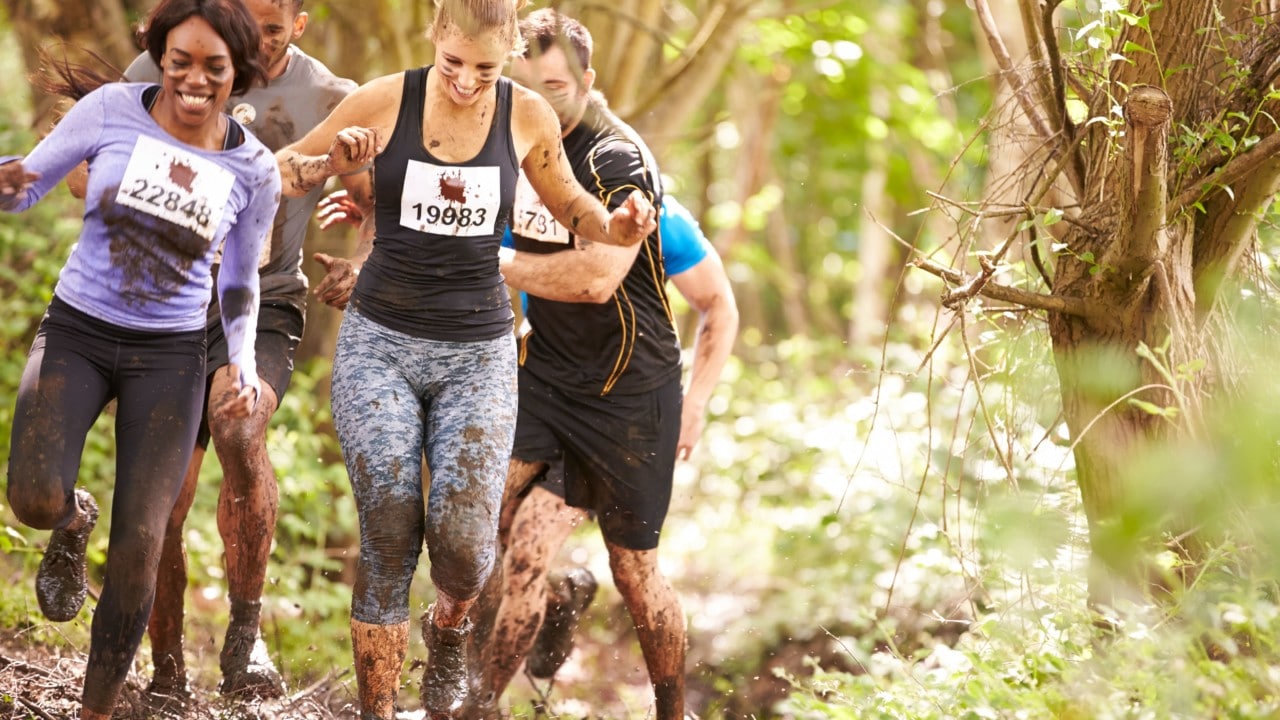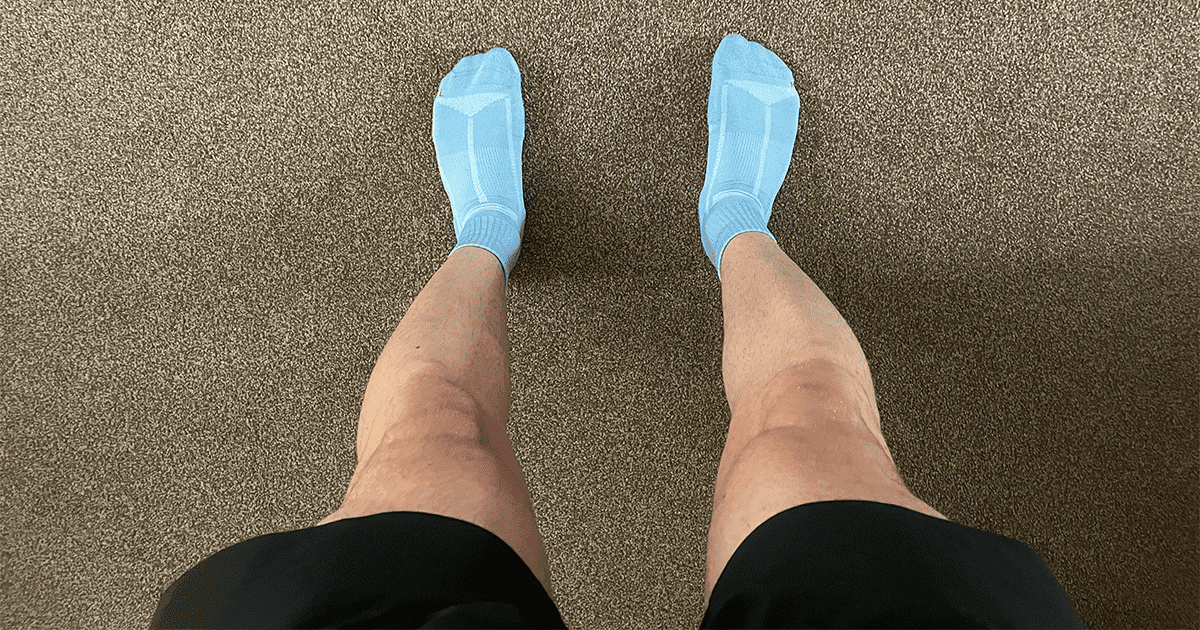Cross country running tips for race day

Congratulations! You’ve made it to the starting line.
After several weeks of training, you’re finally ready to run your first cross country race.
It’s time to trust your training and enjoy the day, getting muddy in the process, of course.
In this blog post, we’ll highlight the most important cross country running tips you’ll need to know to get the most out of race day.
We’ve broken down our advice into three groups:
- Cross country running tips for the night before a race
- Cross country tips for the morning of the race
- Running the race – from start to finish
Related: Cross country running: a beginners guide.
How to prepare for a cross country race the night before?
Preparation the night before your first cross country running race is key.
Poor preparation, such as a lack of sleep, eating the wrong foods, and leaving everything to last minute is a recipe for a bad first race.
What to eat the night before?
It’s essential to eat well the night before a cross country race, consuming plenty of carbohydrates and protein, such as pasta with lean chicken or fish.
Avoid any foods that could give you an upset stomach. And do not try new foods – stick to what you know and what works for you.
Oh, and it goes without saying: avoid alcohol and ideally, simple sugars such as sweets and fizzy drinks.
Hydrating properly the night before your race is also very important.
Many runners think that chugging water right before a race is the only way to hydrate, but you need to consistently replenish your body’s fluids in the lead-up to the event.
Make sure you’ve had at least two litres of water throughout the day and are not going to bed thirsty.
Organise your gear
Organising your gear the night before is a well-known runner’s ritual. You may have heard other runners refer to the “flat lay” of their gear.
This consists of laying out everything you’re going to wear, from your XC running spikes all the way to the hat or buff you’ll put on your head, flat on the ground.
This helps you make sure you’ve thought of everything. You should also pin your race bib to your vest the night before – this will be a time investment that you will not regret making!
Quality rest
Don’t underestimate the power of a good night’s rest! If you don’t fall asleep straight away, don’t worry.
It’s normal to be nervous. If pre-race jitters are making it difficult for you to fall asleep, just try to relax. Do some deep breathing and think positive thoughts about what lies ahead.
Besides, nerves are just excitement? Right?
Cross country running tips for the morning of the race
The best tip for the morning of your race is to arrive early.
The starting area of most races can be a chaotic place, full of runners trying to figure out where to go, spectators trying to wave goodbye to their friends and family, and race officials trying to make sense of it all.
Arrive with plenty of time to sort out where you need to be.
If you’re attending with school, the bus will likely leave early, giving you plenty of time to prepare once there.
The race organisers will most likely have a gear-check area, where you can drop off a bag and have it stored securely until after the race.
They’ll usually organise it by the number on your race bib so that you can be easily identified as the owner of your bag.
Be sure to know the process and any specific requirements if you want to take advantage of it.
Once all your logistics are settled – don’t forget to warm up.
Get your heart rate up by running a few circles, performing a few strides, and doing dynamic stretches. This will help settle your nerves while warming up your body for the starting gun.
When the gun (or whistle) goes off
It’s now time to execute the plan you’ve been building for the last several weeks.
Start off the race strong but do it smartly. The first couple of minutes off the line can be hectic, as runners all try to move into position.
Anyone stuck behind a slower runner will want to manoeuvre their way around them, which creates traffic for everyone else.
Try your best not to lose any ground in the first few minutes, but don’t sacrifice sportsmanship or your overall race strategy – you’ll have time to make up anything lost during the hustle and bustle as everyone gets into their groove.
Once you’ve hit your stride, try not to worry about your specific pace.
Cross country races require your focus on effort as you cross the terrain. The racecourse will surely have different levels of turns, twists, hills, and surfaces that you’ll have to deal with.
Calculating your pace and trying to maintain it over the course will only lead to frustration.
Instead, try to think about the overall distance of the race, and how you’re feeling in terms of your exertion and energy levels as the course progresses.
Make use of the downhills and don’t be afraid to go fast!
If you’ve pushed yourself up a hill, it may feel like a welcome relief to take it easy as you descend the other side.
But, that is not the time to relax. If you’re lucky enough to have a downhill portion on your course, use it to your advantage.
Fly down that hill at full speed and make up any time that you lost huffing and puffing on the uphill.
Don’t forget to enjoy it!
And of course, the most important cross country running tip we can give you for getting through the race is to enjoy it!
You’ve come a long way in your training, and now is the time to see it all come together.
Take in the scenery, feel the rush of competition, and smile your way across the finish line.
We like to think of the race itself as the victory lap – the small thing at the end that you go through once you’ve completed the task of training and preparation.
Getting yourself to the starting line was the hard part, everything after that is pure excitement and fun!
Still feel unprepared for your first race? Read our post on how to get better at cross country running.

Matthew is a lifelong runner, chief tester of all products, the founder of Running101, and freelance content writer for active brands. When he’s not writing, he enjoys lifting weights, cycling in the Lake District, and watching fast cars drive in circles on a Sunday. He also has a BA in sport, exercise and physical activity from the University of Durham.




